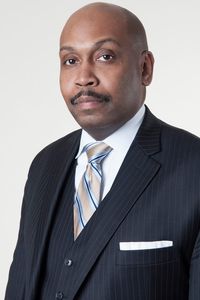Leon Goodman
Leon Goodman was a candidate for the Philadelphia County Court of Common Pleas in Pennsylvania. Goodman was defeated in the primary election on May 16, 2017.
Goodman also ran for the Philadelphia County Court of Common Pleas in 2015. He was defeated in the Democratic primary on May 19, 2015.[1]
Biography
Goodman received an undergraduate degree from North Carolina Central University, a J.D. from Villanova University and an LL.M. from Temple University. Goodman has been an assistant district attorney in Philadelphia for 14 years. He also has experience as a private attorney and as an adjunct professor at Temple University Beasley School of Law.[2]
Elections
2017
Pennsylvania held local judicial elections on November 7, 2017. A primary election occurred on May 16, 2017. The filing deadline for candidates who wished to run in this election was March 7, 2017. Candidates and recently appointed judges of the Courts of Common Pleas must initially run in partisan elections. Subsequent terms are won through retention elections. Elections for the Magisterial District Courts are always partisan. Pennsylvania allows cross-filing for candidates running in partisan elections. Most candidates run in both the Democratic and Republican primaries.[3]
The following candidates ran in the Democratic primary for nine open seats on the Philadelphia County Court of Common Pleas.[4]
| Philadelphia County Court of Common Pleas, Democratic Primary, 2017 | ||
|---|---|---|
| Candidate | Vote % | Votes |
| 7.73% | 63,980 | |
| 7.57% | 62,656 | |
| 5.68% | 47,015 | |
| 5.30% | 43,838 | |
| 4.79% | 39,633 | |
| 4.74% | 39,239 | |
| 4.45% | 36,792 | |
| 4.41% | 36,461 | |
| 4.34% | 35,904 | |
| Jennifer Schultz | 4.14% | 34,224 |
| Daniel Sulman Incumbent | 4.11% | 33,984 |
| Leon Goodman | 4.03% | 33,338 |
| Wendi Barish | 3.85% | 31,831 |
| Henry McGregor Sias | 3.81% | 31,526 |
| Rania Major | 3.67% | 30,393 |
| John Macoretta | 3.60% | 29,829 |
| David Conroy | 3.44% | 28,453 |
| Brian McLaughlin | 3.17% | 26,214 |
| Crystal Powell | 2.99% | 24,756 |
| Vincent Melchiorre Incumbent | 2.94% | 24,360 |
| Lawrence Bozzelli | 2.88% | 23,862 |
| Danyl Patterson | 2.00% | 16,582 |
| Terri Booker | 1.71% | 14,176 |
| Leonard Deutchman | 1.52% | 12,590 |
| Mark Moore | 1.49% | 12,305 |
| Jon Marshall | 0.92% | 7,584 |
| William Rice | 0.72% | 5,985 |
| Total Votes | 827,510 | |
| Source: Pennsylvania Department of State, "2017 Primary Judge of the Court of Common Pleas," accessed May 16, 2017 | ||
2015
- See also: Pennsylvania judicial elections, 2015
Pennsylvania's judicial elections included a primary on May 19, 2015, and a general election on November 3, 2015. The filing deadline for candidates was March 11, 2015.
The following candidates ran in the Democratic primary.
Selection method
- See also: Partisan election of judges
The 439 judges of the court of common pleas are elected to 10-year terms in partisan elections. Candidates may cross-file with both political parties for the partisan primaries, which are followed by general elections where the primary winners from each party compete.[5][6] Judges must run in yes-no retention elections if they wish to continue serving after their first term. A separate part of the ballot is designated for these elections, and judges' names appear without respect to party affiliation.[5][7]
- The president judge of each Pennsylvania Court of Common Pleas is chosen by either peer vote or seniority, depending on the size of the court. Statewide, all courts composed of more than seven individuals must select their chief judge by peer vote. Those with seven or fewer members select their chief by seniority.[5][8]
Qualifications
To serve on an appellate or general jurisdiction court, a judge must:[5]
- have state residence for at least one year;
- be a district resident for at least one year (for common pleas judges);
- be a member of the state bar; and
- be under the age of 75.
While retirement at 75 is mandatory, judges may apply for senior judge status. Senior judges may serve as such until the last day of the calendar year in which they turn 78.[8]
See also
External links
Footnotes
- ↑ Cite error: Invalid
<ref>tag; no text was provided for refs namedelection2015 - ↑ Facebook.com, "Friends of Leon Goodman: About," accessed April 9, 2015
- ↑ Pennsylvania Department of State, "2017 Election Calendar," accessed February 23, 2017
- ↑ Pennsylvania Department of State, "Candidate Database," accessed March 20, 2017
- ↑ 5.0 5.1 5.2 5.3 American Judicature Society, "Methods of Judicial Selection: Pennsylvania," archived October 3, 2014
- ↑ The Morning Call, "Ban Cross-filing As One Step," January 24, 1985
- ↑ The Unified Judicial System of Pennsylvania, "In Re: Nomination Papers of Marakay Rogers, Christina Valente and Carl J. Romanelli," November 7, 2006
- ↑ 8.0 8.1 The Pennsylvania Code, "Chapter 7. Assignment of Judges," accessed September 3, 2014
| ||||||||||
| ||||||||||
Federal courts:
Third Circuit Court of Appeals • U.S. District Court: Eastern District of Pennsylvania, Middle District of Pennsylvania, Western District of Pennsylvania • U.S. Bankruptcy Court: Eastern District of Pennsylvania, Middle District of Pennsylvania, Western District of Pennsylvania
State courts:
Supreme Court of Pennsylvania • Pennsylvania Superior Court • Pennsylvania Commonwealth Court • Pennsylvania Court of Common Pleas • Pennsylvania Magisterial Districts
State resources:
Courts in Pennsylvania • Pennsylvania judicial elections • Judicial selection in Pennsylvania





